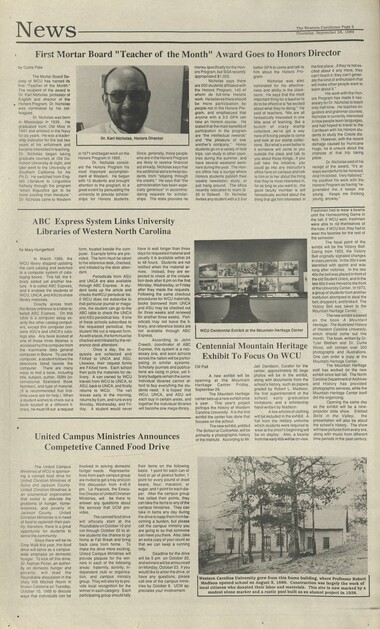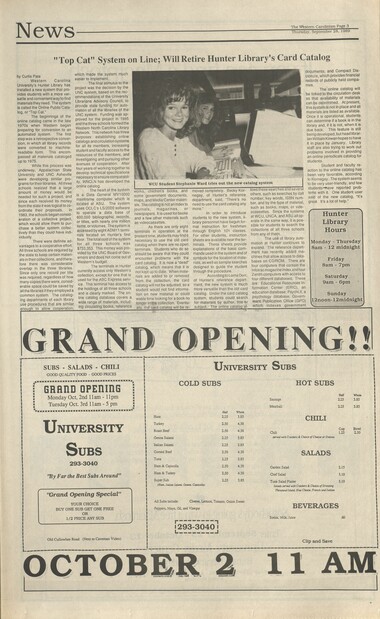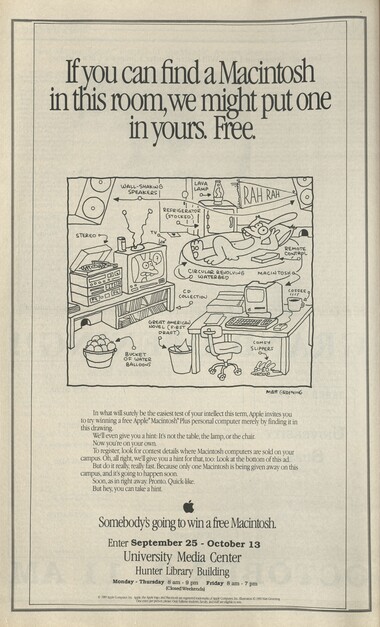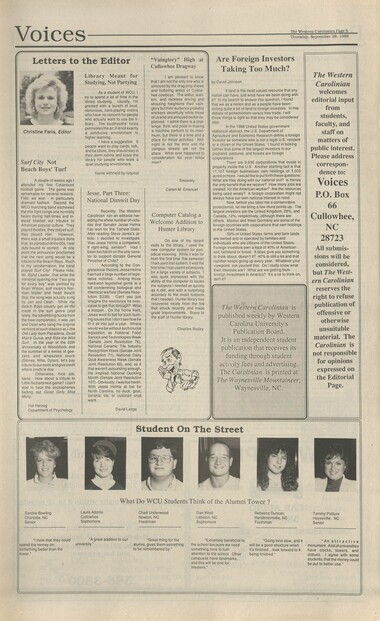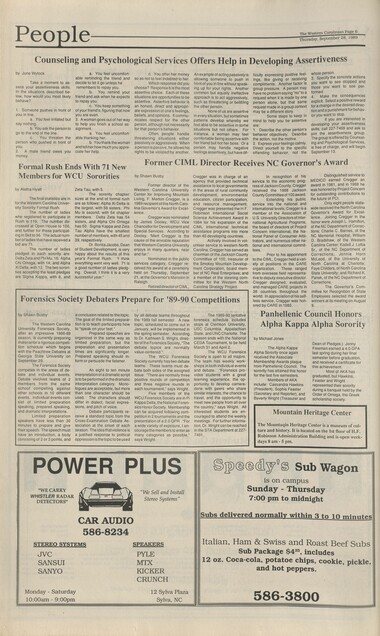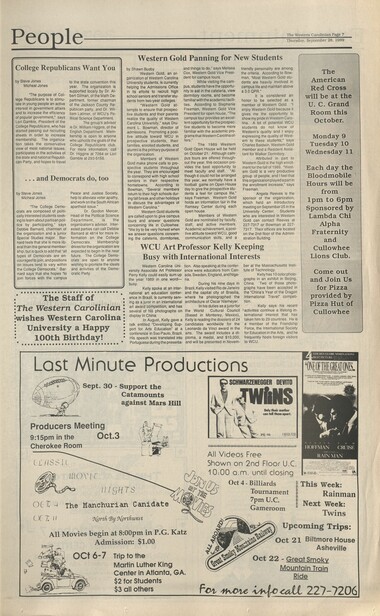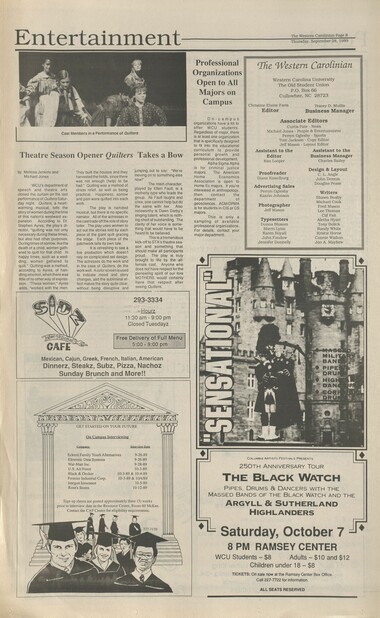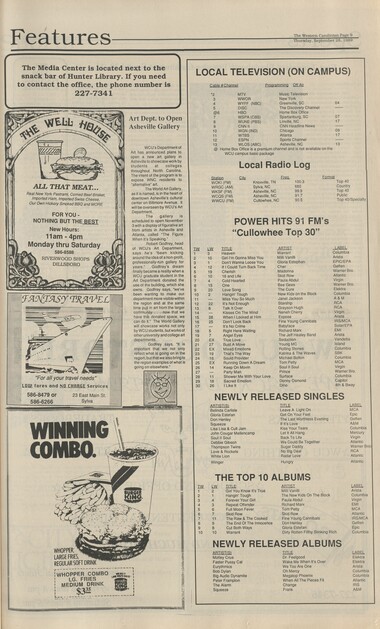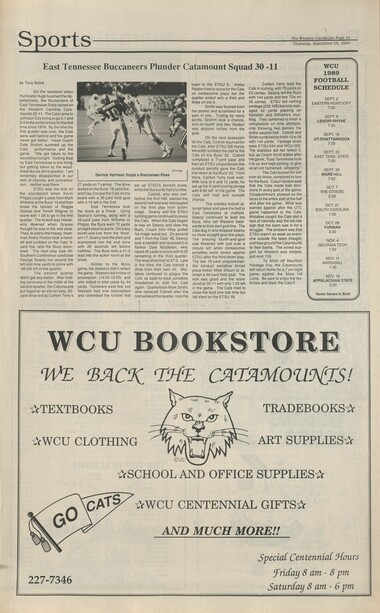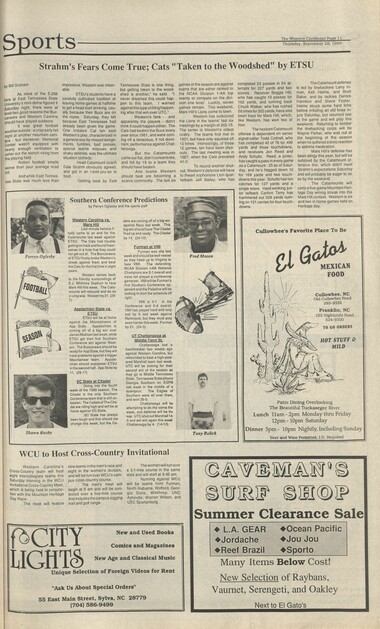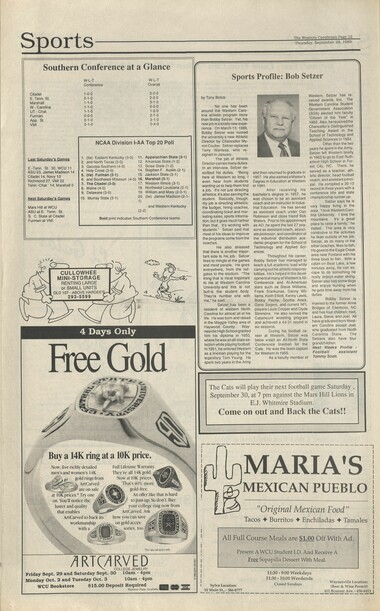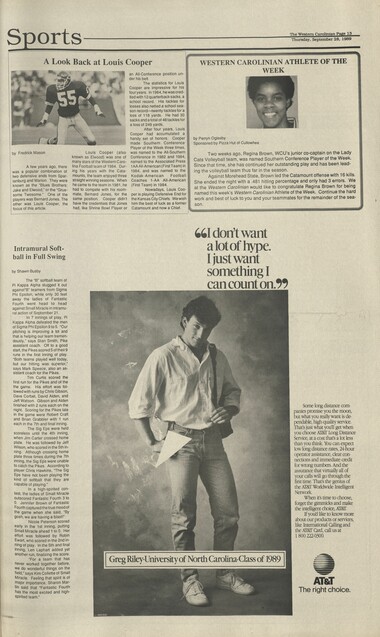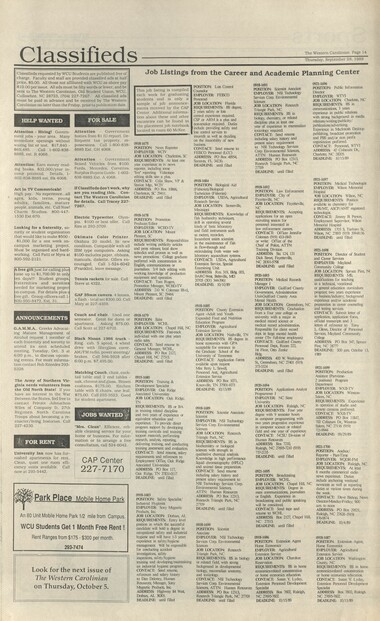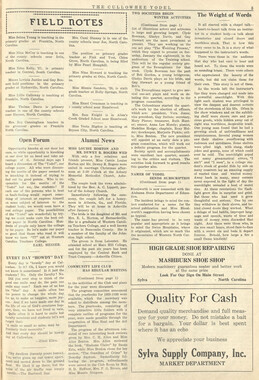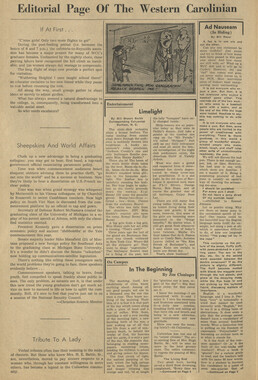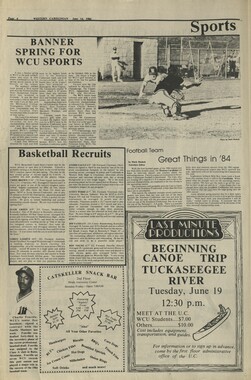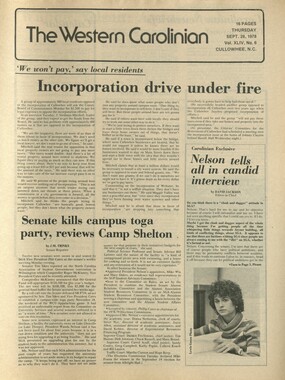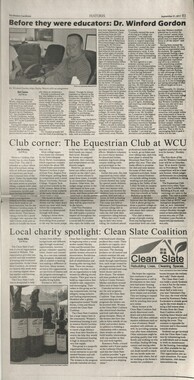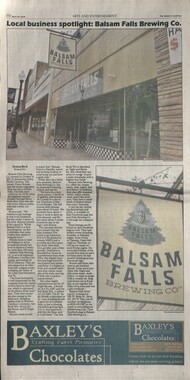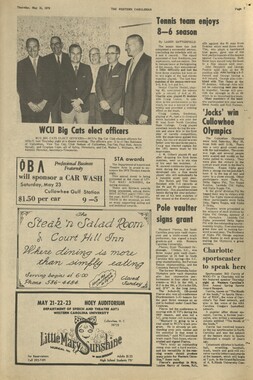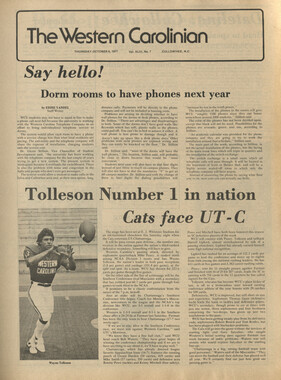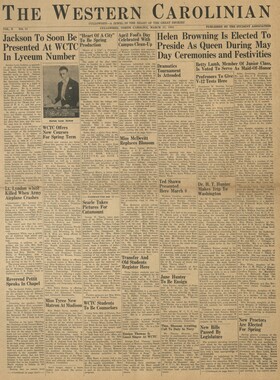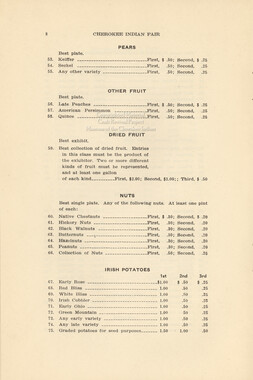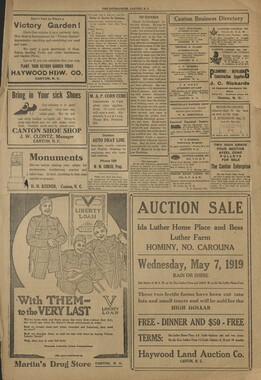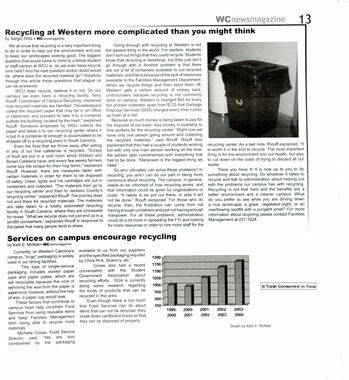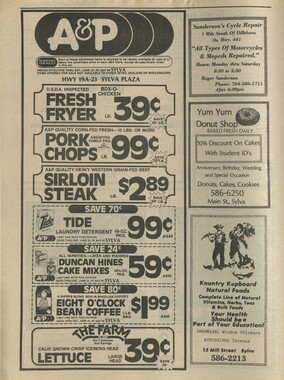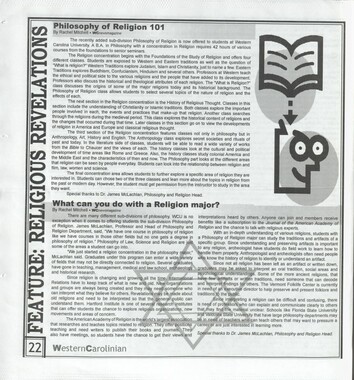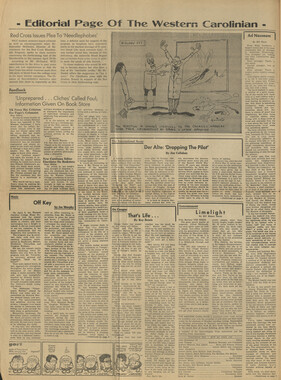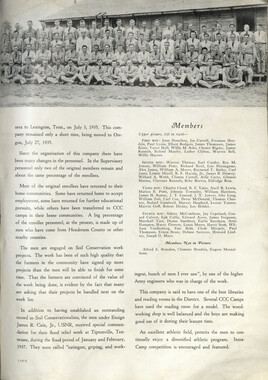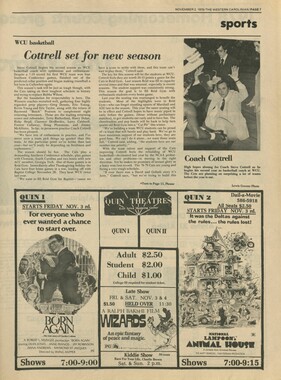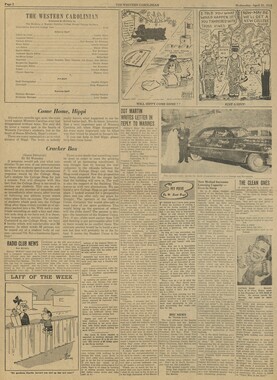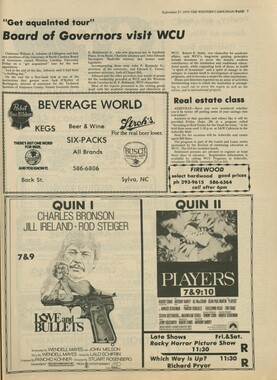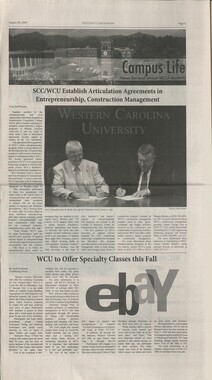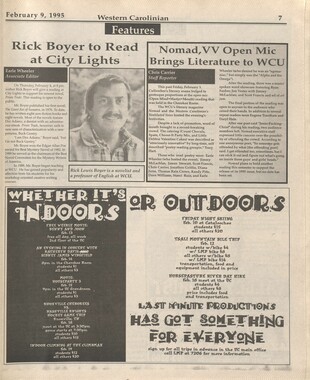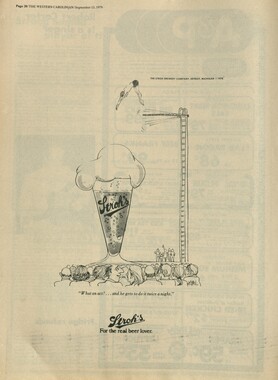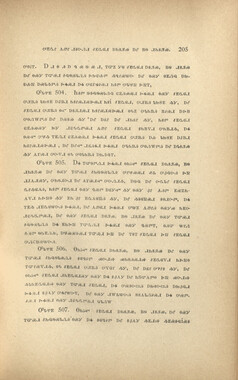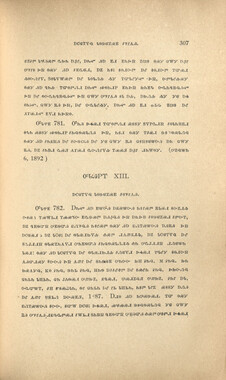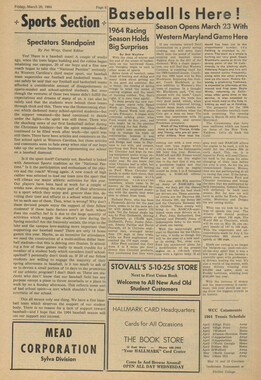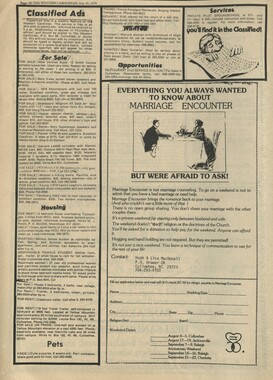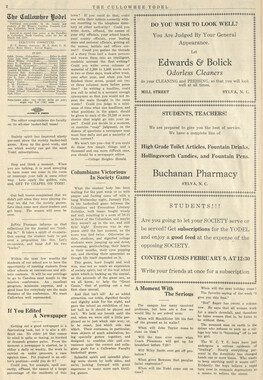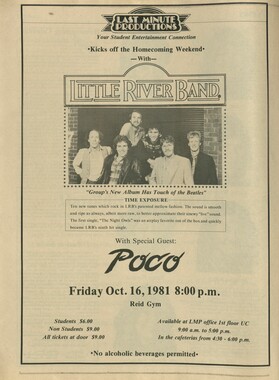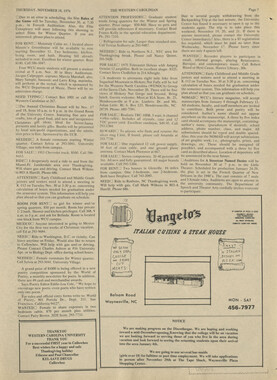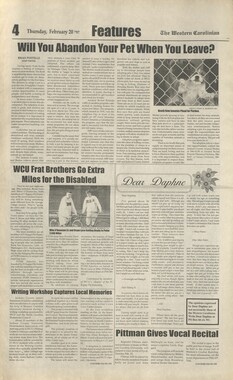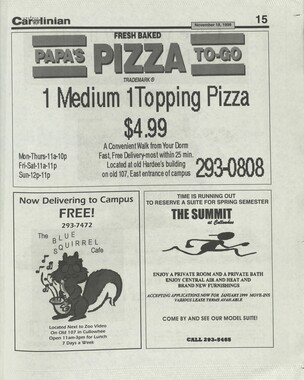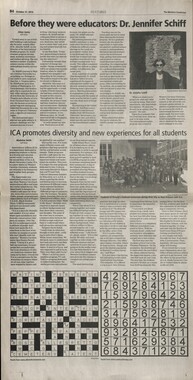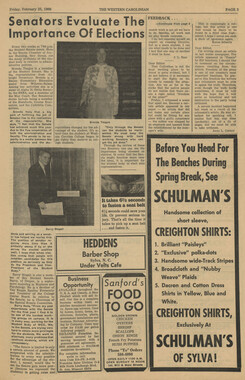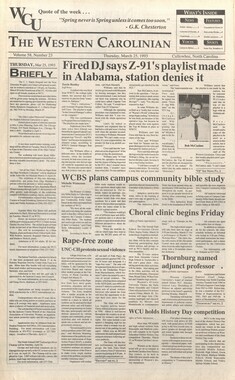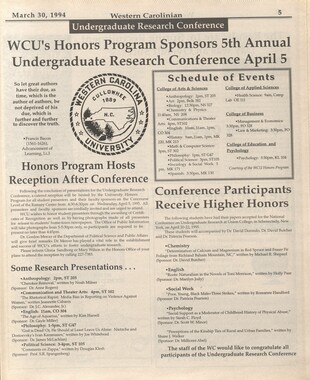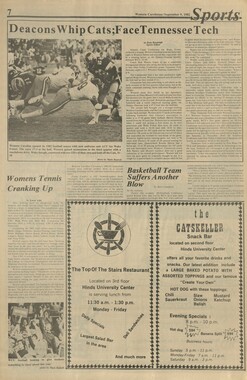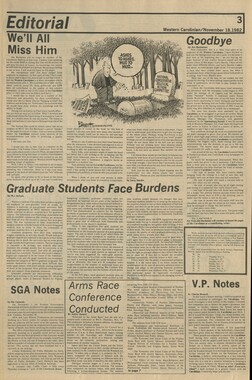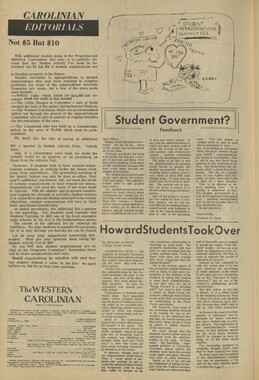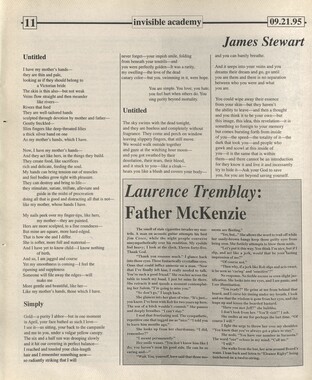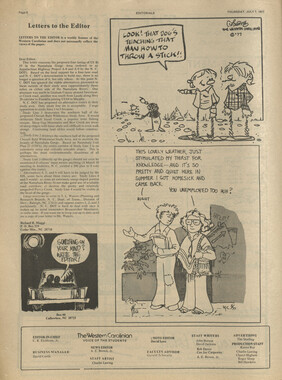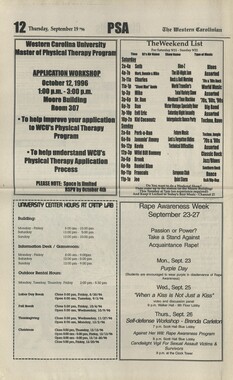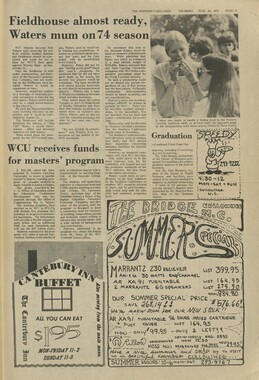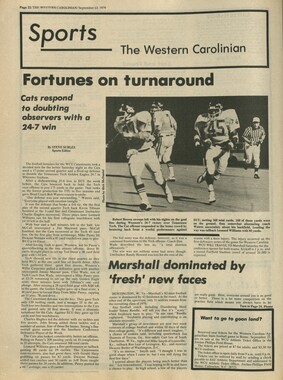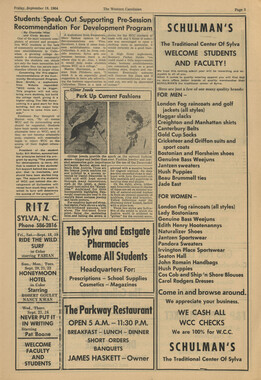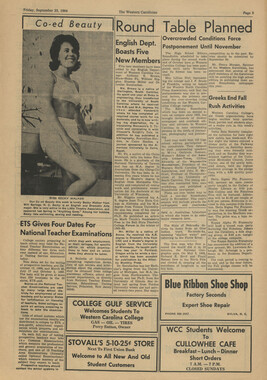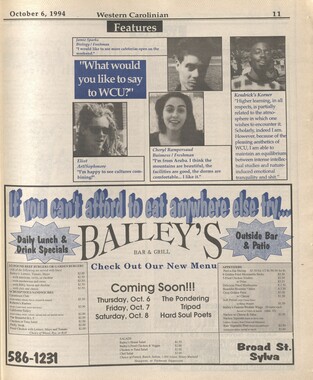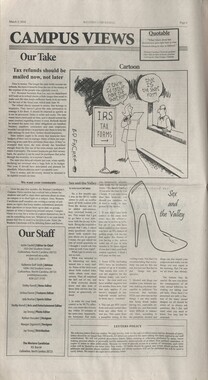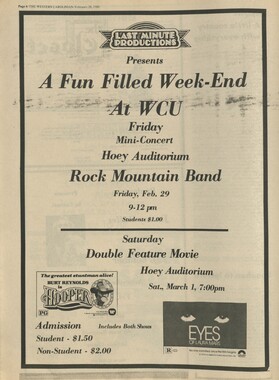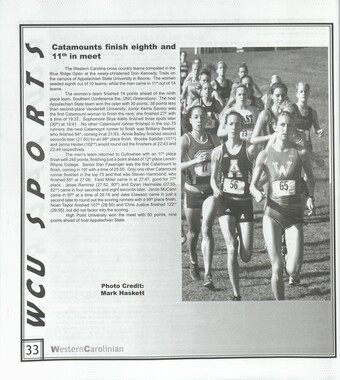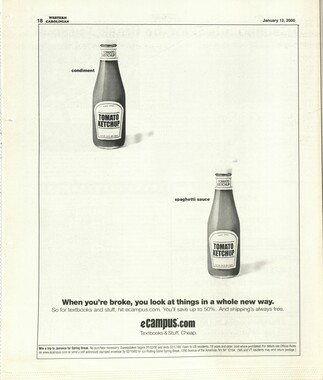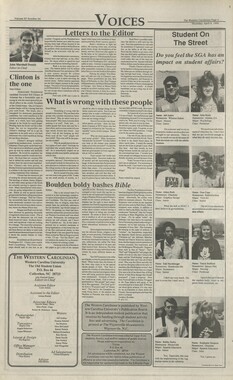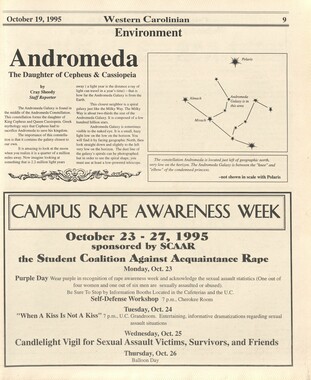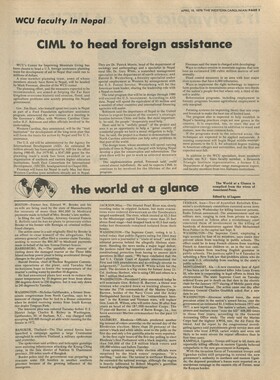Western Carolina University (21)
View all
- Canton Champion Fibre Company (2308)
- Cherokee Traditions (291)
- Civil War in Southern Appalachia (165)
- Craft Revival (1942)
- George Masa Collection (137)
- Great Smoky Mountains - A Park for America (3182)
- Highlights from Western Carolina University (422)
- Horace Kephart (998)
- Journeys Through Jackson (159)
- LGBTQIA+ Archive of Jackson County (90)
- Oral Histories of Western North Carolina (318)
- Picturing Appalachia (6617)
- Stories of Mountain Folk (413)
- Travel Western North Carolina (153)
- Western Carolina University Fine Art Museum Vitreograph Collection (129)
- Western Carolina University Herbarium (92)
- Western Carolina University: Making Memories (738)
- Western Carolina University Publications (2491)
- Western Carolina University Restricted Electronic Theses and Dissertations (146)
- Western North Carolina Regional Maps (71)
- World War II in Southern Appalachia (131)
University of North Carolina Asheville (6)
View all
- Allanstand Cottage Industries (62)
- Appalachian National Park Association (53)
- Bennett, Kelly, 1890-1974 (1463)
- Berry, Walter (76)
- Brasstown Carvers (40)
- Carver, George Washington, 1864?-1943 (26)
- Cathey, Joseph, 1803-1874 (1)
- Champion Fibre Company (233)
- Champion Paper and Fibre Company (297)
- Cherokee Indian Fair Association (16)
- Cherokee Language Program (22)
- Crowe, Amanda (40)
- Edmonston, Thomas Benton, 1842-1907 (7)
- Ensley, A. L. (Abraham Lincoln), 1865-1948 (275)
- Fromer, Irving Rhodes, 1913-1994 (70)
- George Butz (BFS 1907) (46)
- Goodrich, Frances Louisa (120)
- Grant, George Alexander, 1891-1964 (96)
- Heard, Marian Gladys (60)
- Kephart, Calvin, 1883-1969 (15)
- Kephart, Horace, 1862-1931 (313)
- Kephart, Laura, 1862-1954 (91)
- Laney, Gideon Thomas, 1889-1976 (439)
- Masa, George, 1881-1933 (61)
- McElhinney, William Julian, 1896-1953 (44)
- Niggli, Josephina, 1910-1983 (10)
- North Carolina Park Commission (105)
- Osborne, Kezia Stradley (9)
- Owens, Samuel Robert, 1918-1995 (11)
- Penland Weavers and Potters (36)
- Roberts, Vivienne (15)
- Roth, Albert, 1890-1974 (142)
- Schenck, Carl Alwin, 1868-1955 (1)
- Sherrill's Photography Studio (2565)
- Southern Highland Handicraft Guild (127)
- Southern Highlanders, Inc. (71)
- Stalcup, Jesse Bryson (46)
- Stearns, I. K. (213)
- Thompson, James Edward, 1880-1976 (226)
- United States. Indian Arts and Crafts Board (130)
- USFS (683)
- Vance, Zebulon Baird, 1830-1894 (1)
- Weaver, Zebulon, 1872-1948 (58)
- Western Carolina College (230)
- Western Carolina Teachers College (282)
- Western Carolina University (2008)
- Western Carolina University. Mountain Heritage Center (18)
- Whitman, Walt, 1819-1892 (10)
- Wilburn, Hiram Coleman, 1880-1967 (73)
- Williams, Isadora (3)
- Cain, Doreyl Ammons (0)
- Crittenden, Lorraine (0)
- Rhodes, Judy (0)
- Smith, Edward Clark (0)
- Appalachian Region, Southern (3032)
- Asheville (N.C.) (1945)
- Avery County (N.C.) (26)
- Blount County (Tenn.) (200)
- Buncombe County (N.C.) (1680)
- Cherokee County (N.C.) (283)
- Clay County (N.C.) (556)
- Graham County (N.C.) (247)
- Great Smoky Mountains National Park (N.C. and Tenn.) (535)
- Haywood County (N.C.) (3573)
- Henderson County (N.C.) (70)
- Jackson County (N.C.) (4926)
- Knox County (Tenn.) (61)
- Knoxville (Tenn.) (21)
- Lake Santeetlah (N.C.) (14)
- Macon County (N.C.) (421)
- Madison County (N.C.) (216)
- McDowell County (N.C.) (39)
- Mitchell County (N.C.) (135)
- Polk County (N.C.) (35)
- Qualla Boundary (982)
- Rutherford County (N.C.) (78)
- Swain County (N.C.) (2187)
- Transylvania County (N.C.) (270)
- Watauga County (N.C.) (12)
- Waynesville (N.C.) (86)
- Yancey County (N.C.) (72)
- Aerial Photographs (3)
- Aerial Views (60)
- Albums (books) (4)
- Articles (1)
- Artifacts (object Genre) (228)
- Bibliographies (1)
- Biography (general Genre) (2)
- Cards (information Artifacts) (38)
- Clippings (information Artifacts) (193)
- Copybooks (instructional Materials) (3)
- Crafts (art Genres) (622)
- Depictions (visual Works) (21)
- Design Drawings (1)
- Digital Moving Image Formats (2)
- Drawings (visual Works) (185)
- Envelopes (115)
- Exhibitions (events) (1)
- Facsimiles (reproductions) (1)
- Fiction (general Genre) (4)
- Financial Records (12)
- Fliers (printed Matter) (67)
- Glass Plate Negatives (381)
- Guidebooks (2)
- Internegatives (10)
- Interviews (823)
- Land Surveys (102)
- Letters (correspondence) (1070)
- Manuscripts (documents) (618)
- Maps (documents) (177)
- Memorandums (25)
- Minutes (administrative Records) (59)
- Negatives (photographs) (6192)
- Newsletters (1290)
- Newspapers (2)
- Notebooks (8)
- Occupation Currency (1)
- Paintings (visual Works) (1)
- Pen And Ink Drawings (1)
- Periodicals (194)
- Personal Narratives (10)
- Photographs (12977)
- Plans (maps) (1)
- Poetry (6)
- Portraits (4573)
- Postcards (329)
- Programs (documents) (181)
- Publications (documents) (2444)
- Questionnaires (65)
- Relief Prints (26)
- Sayings (literary Genre) (1)
- Scrapbooks (282)
- Sheet Music (2)
- Slides (photographs) (402)
- Songs (musical Compositions) (2)
- Sound Recordings (802)
- Specimens (92)
- Speeches (documents) (18)
- Tintypes (photographs) (8)
- Transcripts (329)
- Text Messages (0)
- A.L. Ensley Collection (275)
- Appalachian Industrial School Records (7)
- Appalachian National Park Association Records (336)
- Axley-Meroney Collection (2)
- Bayard Wootten Photograph Collection (20)
- Bethel Rural Community Organization Collection (7)
- Blumer Collection (5)
- C.W. Slagle Collection (20)
- Canton Area Historical Museum (2110)
- Carlos C. Campbell Collection (564)
- Cataloochee History Project (64)
- Cherokee Studies Collection (4)
- Daisy Dame Photograph Album (5)
- Daniel Boone VI Collection (1)
- Doris Ulmann Photograph Collection (112)
- Elizabeth H. Lasley Collection (1)
- Elizabeth Woolworth Szold Fleharty Collection (4)
- Frank Fry Collection (95)
- George Masa Collection (173)
- Gideon Laney Collection (452)
- Hazel Scarborough Collection (2)
- Hiram C. Wilburn Papers (28)
- Historic Photographs Collection (236)
- Horace Kephart Collection (861)
- Humbard Collection (33)
- Hunter and Weaver Families Collection (1)
- I. D. Blumenthal Collection (4)
- Isadora Williams Collection (4)
- Jesse Bryson Stalcup Collection (47)
- Jim Thompson Collection (224)
- John B. Battle Collection (7)
- John C. Campbell Folk School Records (80)
- John Parris Collection (6)
- Judaculla Rock project (2)
- Kelly Bennett Collection (1482)
- Love Family Papers (11)
- Major Wiley Parris Civil War Letters (3)
- Map Collection (12)
- McFee-Misemer Civil War Letters (34)
- Mountain Heritage Center Collection (4)
- Norburn - Robertson - Thomson Families Collection (44)
- Pauline Hood Collection (7)
- Pre-Guild Collection (2)
- Qualla Arts and Crafts Mutual Collection (12)
- R.A. Romanes Collection (681)
- Rosser H. Taylor Collection (1)
- Samuel Robert Owens Collection (94)
- Sara Madison Collection (144)
- Sherrill Studio Photo Collection (2558)
- Smoky Mountains Hiking Club Collection (616)
- Stories of Mountain Folk - Radio Programs (374)
- The Reporter, Western Carolina University (510)
- Venoy and Elizabeth Reed Collection (16)
- WCU Gender and Sexuality Oral History Project (36)
- WCU Mountain Heritage Center Oral Histories (25)
- WCU Oral History Collection - Mountain People, Mountain Lives (71)
- WCU Students Newspapers Collection (1923)
- Western North Carolina Tomorrow Black Oral History Project (69)
- William Williams Stringfield Collection (2)
- Zebulon Weaver Collection (109)
- African Americans (390)
- Appalachian Trail (35)
- Artisans (521)
- Cherokee art (84)
- Cherokee artists -- North Carolina (10)
- Cherokee language (21)
- Cherokee pottery (101)
- Cherokee women (208)
- Church buildings (190)
- Civilian Conservation Corps (U.S.) (114)
- College student newspapers and periodicals (2012)
- Dams (115)
- Dance (1023)
- Education (222)
- Floods (63)
- Folk music (1015)
- Forced removal, 1813-1903 (2)
- Forest conservation (220)
- Forests and forestry (1198)
- Gender nonconformity (4)
- Great Smoky Mountains National Park (N.C. and Tenn.) (181)
- Hunting (47)
- Landscape photography (25)
- Logging (122)
- Maps (83)
- Mines and mineral resources (9)
- North Carolina -- Maps (18)
- Paper industry (38)
- Postcards (255)
- Pottery (135)
- Railroad trains (72)
- Rural electrification -- North Carolina, Western (3)
- School integration -- Southern States (2)
- Segregation -- North Carolina, Western (5)
- Slavery (5)
- Sports (452)
- Storytelling (243)
- Waterfalls -- Great Smoky Mountains (N.C. and Tenn.) (66)
- Weaving -- Appalachian Region, Southern (280)
- Wood-carving -- Appalachian Region, Southern (328)
- World War, 1939-1945 (174)
Western Carolinian Volume 55 Number 06
Item
Item’s are ‘child’ level descriptions to ‘parent’ objects, (e.g. one page of a whole book).
-
-
News The Western Carolinian Page 2 Thursday, September 28, 1989 First Mortar Board "Teacher of the Month" Award Goes to Honors Director by Curtis Pate The Mortar Board Society of WCU has named its first "Teacher of the Month." The recipient of the award is Dr. Karl Nicholas, professor of English and director of the . Honors Program. Dr. Nicholas was nominated by his colleagues. Dr. Nicholas was born in Mississippi in 1939. He graduated from Old Miss in 1961 and enlisted in the Navy for six years. He was a leadership instructor for the last two years of his enlistment and became interested in teaching. Dr. Nicholas began taking graduate courses at Old Dominion University at night, and later went to the University of Southern California for his Ph.D. He switched from English Literature to Linguistics halfway through the program "when linguistics got to be more exciting than literature." Dr. Nicholas came to Western Dr. Karl Nicholas, Honors Director in 1971 and began work on the Honors Program in 1985. Dr. Nicholas considers the Honors Program his most important accomplishment at Western. He began with 12 students and brought attention to the program, to a great extent by persuading the university to provide scholarships for Honors students. Since, generally, those people who are in the Honors Program are likely to receive financial aid already, Nicholas says that the additional aid is to keep students from "slipping through the cracks." He says that "the administration has been especially generous" in accommodating requests for scholarships. The state provides no money specifically for the Honors Program, but SGA recently appropriated $1,000. Nicholas says there are 200 students affiliated with the Honors Program, 140 of whom do full-time Honors work. He believes there should be more participation by people not in the Honors Program, and emphasized that anyone with a 3.0 GPA can take an Honors course. He stated that the main benefits of participation in the program are "the intellectual rewards" and "the pleasure of one another's company." Honor students go on a variety of field trips, can study in other countries during the summer, and have several weekend seminars during the year. The Honors office has a lounge where Honors students publish their weekly newsletter, study, or just hang around. The office recently relocated to room G- 55 in Stillwell. Dr. Nicholas invites any student with a 3.0 or better GPA to come and talk to him about the Honors Program. Nicholas was also nominated for his effectiveness and ability in the classroom. He says that the most important thing for a teacher to do to be effective is "be excited about what they're doing." He said of teachers, "We are all fantastically interested in one little area of learning, like a bunch of crazy stamp collectors...we've got a way here of forcing people to come and look at our stamp collections. But what's even better is if someone will come to you outside the class and talk to you about those things...If you just take the initiative, you could go into any instructor's office here on campus and talk to him or to her about the thing that they're most interested in, for as long as you want to...the good faculty member is still fantastically excited about the thing that got him interested in the first place., .if they're not excited about it any more, they can't teach it; they can't generate the kind of enthusiasm that will make other people want to learn about it." His work with the Honors Program has made it necessary for Dr. Nicholas to teach only half-time. He teaches linguistics and grammar courses. Nicholas is currently interested in how people learn languages, and had hoped to travel to the Carribean with his Honors students to study the Creole dialect. However, with the recent damage caused by Hurricane Hugo, he is unsure about the chances of that trip taking place. Dr. Nicholas said of his receipt of the award, "It's always wonderful to be honored. And I'm tickled. Very flattered." He credited his work with the Honors Program as having "rejuvenated me...it keeps me young. Keeps me thinking young, anyway." ABC Express System Links University Libraries of Western North Carolina by Mary Hungerford In March 1989, the WCU library stopped updating the card catalog and switched to a computer system of cataloging books. This fall, the library added yet another feature. It is called ABC Express, and it enables the students of WCU, UNCA, and ASU to share library materials. Directly across from the library entrance is a table labeled ABC Express. On this table is a computer setup exactly like other catalog computers, except this computer contains ASU's and UNCA's catalogs also. Any book located at one of these three libraries is accessed by this computerfrom the mainframe data general computer in Boone. To use the computer, a student follows the directions listed beside the computer. There are many ways to find a book, including title, subject, author, ISBN (International Standard Book Number), and type of material. (It is recommended lhat first- time users ask for help.) When a student wishes to check out a book located at a different library, he must fill out a request form, located beside the computer. Example forms are provided. The form must be taken to the reference desk, checked, and initialed by the desk attendant. Periodicals from ASU and UNCA are also available through ABC Express. A student looks up the article and checks theWCU periodical list. If WCU does not subscribe to that particular journal or magazine, the student can go to the ABC table to check the UNCA and ASU periodical lists. If one of these schools subscribes to the requested periodical, the student fills out a request form. As with a book, the form must be checked and initialed by the reference desk attendant. Once a day, the requests are collected and FAXed to UNCA and ASU. Likewise, their request forms are FAXed here. Each school then pulls the materials for delivery. A van owned by WCU travels from WCU to UNCA, to ASU, back to UNCA, and finally returns to WCU. The van leaves early in the morning, returns by 6 pm, and runs every Monday, Wednesday, and Friday. A student would never have to wait longer than three days for requested material and usually it is available within 24 to 48 hours. Students are not notified when the material arrives. Instead, they are expected to check at the circulation desk after 6 pm on the first Monday, Wednesday, or Friday after they made the requests. Following the same checkout procedures for WCU materials, books borrowed from UNCA and ASU may be checked out for three weeks and renewed tor another three weeks. Periodicals may not leave the library, and reference books are not available through ABC Express. According to John Creech, coordinator of ABC Express, this system is a necessary one, and soon schools across the nation will be participating in similar systems. Scholarly journals and publications are rising in price, yet library budgets remain the same. Individual libraries cannot afford to buy everything the students need. It is hoped that WCU, UNCA, and ASU will each buy in certain areas, and together the individual libraries will become one mega-library. United Campus Ministries Announces Competetive Canned Food Drive The United Campus Ministries of WCU is sponsoring a canned food drive for United Christian Ministries of Sylva and Jackson County. United Christian Ministries is an ecumenical organization that seeks to alleviate the problems of hunger, home- lessness, and poverty in Jackson County. United Christian Ministries is in need of food to replenish their pantry; therefore, there is a great opportunity for students to serve the community. Since there will be no Crop Walk this year, this food drive will serve as a campus- wide emphasis on domestic hunger. To kickoff this drive, Dr. Nathan Porter, an authority on domestic hunger and poverty, will lead the Roundtable discussion in the Mary Will Mitchell Room in Brown Cafeteria on Tuesday, October 10, 1989 to discuss ways that individuals can be involved in solving domestic hunger needs. Representatives from each campusgroup are invited to get a tray and join this discussion from 4:45-6 pm. Liz Peacock, the Executive Directorof UnitedChristian Ministries, will be there to answer any questions about the services that UCM provides. The canned food drive will officially start at the Roundtable on October 10 and run through October 20 to allow students the chance to go home at Fall Break and bring back cans from home. To make the drive more exciting, United Campus Ministries will provide plaques for the winners in each of the following areas: fraternity, sorority, independent club or organization, and campus ministry group. They will also try to provide local recognition for the winner in each category. Each participating group should tally their items on the following basis: 1 point for each can of food or jar of peanut butter; 1 point for every pound of dried beans, flour, macaroni, or sugar; and 1 point for each diaper. After the campus group has tallied their points, they can take the items to any of the campus ministries. They can take in items any day during the drive to keep them from becoming a burden, but please call the campus ministry, you are going to so that someone can meet you there. Also, take an extra copy of your count so that we can keep a running tally. Deadline for the drive will be 5 pm on October 20, and winners will be announced on Monday, October 23. If you would like to enterthe drive, or have any questions, please call one of the campus ministries by October 9. UCM appreciates your involvement. Centennial Mountain Heritage Exhibit To Focus On WCU Clif Pait A new exhibit will be opening at the Mountain Heritage Center Friday, September 29. The Mountain Heritage center sets up a new exhibit once a year. This year's project portrays the history of Western Carolina University. It is the first exhibit the center has done that focuses on the school. The new exhibit, entitled The School at Cullowhee, will be primarily a photographic history of the institute. According to Mr. Jan Davidson, Curator for the center, approximately 80 large photos will be in the exhibit, along with documents from the school's history, such as papers graded by Robert L. Madison, the first superintendent of the school; early graduation invitations; and a scholarship hand-written by Madison. V A few articles of clothing will be* included in the exhibit. A hat from the military uniforms which students were required to wear at the shool's beginning will be on display. Also, a beanie from the early 60s will be on view. Freshmen had to wear a beanie until the Homecoming Game in the fall; if WCU won, freshmen were able to rid themselves of the hats; if WCU lost, they had to wear the beanies for the rest of the semester. The focal point of the exhibit will be the Victory Bell. Dating from 1903, the Victory Bell originally signaled changes in class periods. Inthe30sitwas identified with sports and was rung after victories. In the late 40s the bell was placed in front of the old Student Union, and in the late 60s it was moved to the front of the University Center. In 1973, a group of students from another institution attempted to steal the bell, dropped it, and broke it. The Victory Bell was taken to the Mountain Heritage Center. The new exhibit is based on the book A Mountain Heritage: The Illustrated History of Western Carolina University, which should come out this month. The book, written by Dr. Tyler Blethen and Dr. Curtis Wood, will contain over 300 photographs and illustrations. One can order a copy at the Mountain Heritage Center. The Mountain Heritage staff has worked on the new exhibit since last fall. The North Carolina Department of Archives and History has provided photographic services, while the Mountain Heritage Center itself did the organizing. Opening the same day as the exhibit will be a nine- projector slide show. Entitled Bells in the Valley, the presentation will also be about the school's history. The show will have pictures from every era, along with music from different time periods in the past century. Western Carolina University grew from this frame building, where Professor Robert Madison opened school on August 5, 1889. Construction was largely the work of local citizens who donated their labor and materials. This site is now marked by a modest stone marker and a rustic pool built as an alumni project in 1938.
Object
Object’s are ‘parent’ level descriptions to ‘children’ items, (e.g. a book with pages).
-
The Western Carolinian is Western Carolina University's student-run newspaper. The paper was published as the Cullowhee Yodel from 1924 to 1931 before changing its name to The Western Carolinian in 1933.
-
